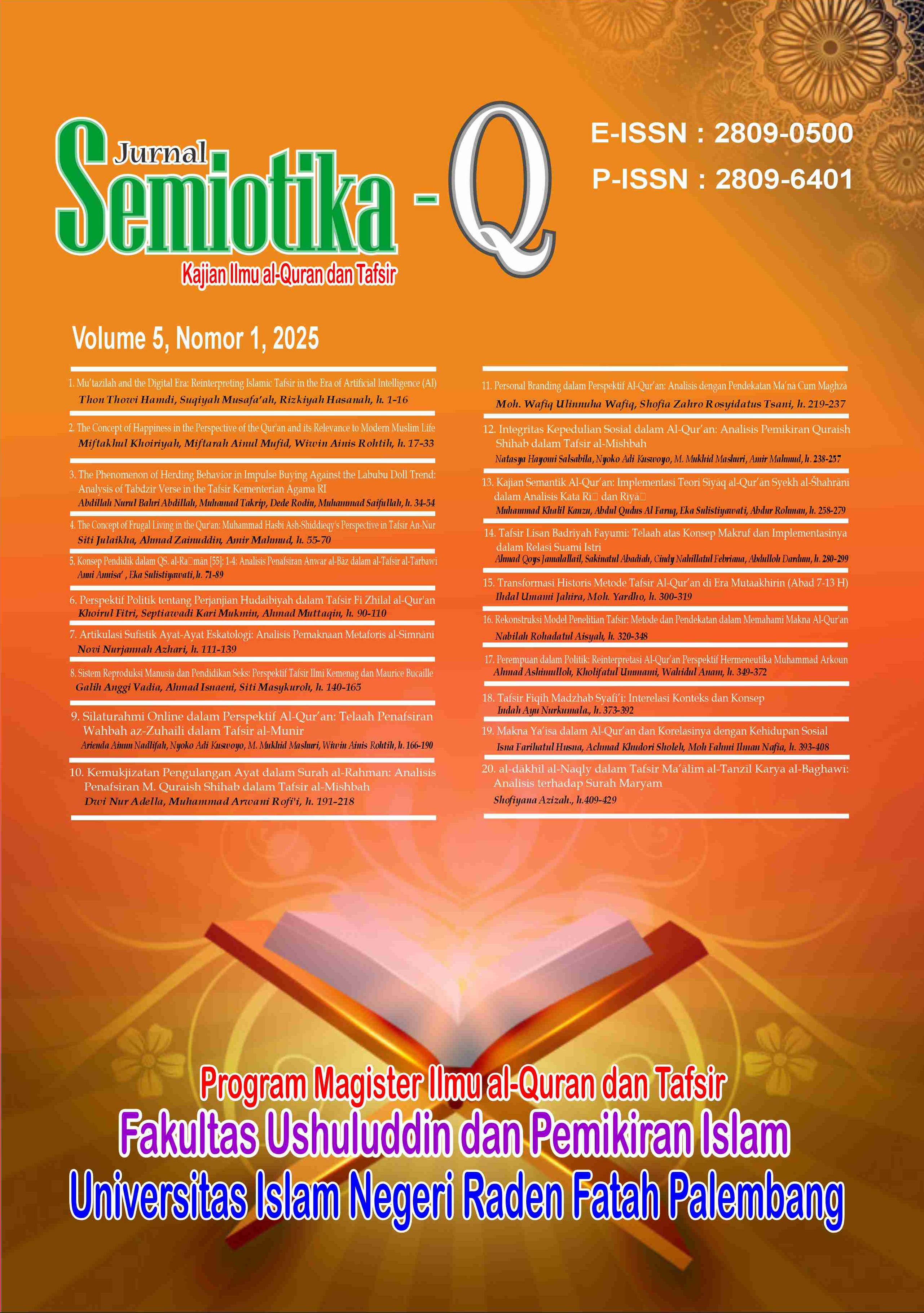Mu’tazilah and the Digital Era: Reinterpreting Islamic Tafsir in the Era of Artificial Intelligence (AI)
Main Article Content
Abstract
The development of technology in the digital era, especially artificial intelligence (AI), demands an update in the approach to Islamic interpretation. This study aims to analyze how the principles of Mu'tazilah rationality can be integrated with the development of AI to interpret Islam in the modern era. The research approach uses a qualitative method with a case study design. The study subjects included Mudzir Ma'had Aly Probolinggo, Head of the Study Program, Musyrif, the IT Team, and Mahasantri. Data collection techniques were done through in-depth interviews, literature studies, and digital document analysis. Data analysis includes data reduction, data presentation, and conclusion. The study results indicate that using AI in Islamic interpretation can expand the understanding of classical texts with a more rational, contextual, and inclusive approach. The Mu'tazilah perspective provides a philosophical foundation for aligning artificial intelligence with the principles of Justice, reason, and humanity. This has proven effective in creating a new dialogue space that supports the renewal of Islamic thought in the digital era. This study contributes significantly to efforts to understand Islam through the lens of modern technology while adhering to the principles of faith and rationality.
Article Details

This work is licensed under a Creative Commons Attribution-ShareAlike 4.0 International License.
Authors who publish with this journal agree to the following terms:
- Authors retain copyright and grant the journal right of first publication with the work simultaneously licensed under a Creative Commons Attribution-ShareAlike 4.0 International License that allows others to share the work with an acknowledgement of the work's authorship and initial publication in this journal.
- Authors are able to enter into separate, additional contractual arrangements for the non-exclusive distribution of the journal's published version of the work (e.g., post it to an institutional repository or publish it in a book), with an acknowledgement of its initial publication in this journal.
- Authors are permitted and encouraged to post their work online (e.g., in institutional repositories or on their website) prior to and during the submission process, as it can lead to productive exchanges, as well as earlier and greater citation of published work
How to Cite
References
Abu bakar, Arif Ridha. “Al-Qur’an Dan Kecerdasan Buatan (Suatu Kajian Tematik)” 5, no. 1 (2024): 190–203.
Ahmi, Aidi. “Leveraging Bibliometrics and AI : Empowering Islamic Studies Scholars to Uncover Emerging Topics and Navigate Diverse Perspectives,” 2024, 137–44.
Amalia, Lisa, Rani Rakhmawati, Siti Khoeriyah, U I N K H Abdurrahman, and Wahid Pekalongan. “The Relevance of Artificial Intelligence and Divine Principles According to Islamic Interpretation in Human Interaction with Artificial Intelligence,” 2024, 237–46.
Analiansyah. “Peran Akal Dan Kebebasan Bertindak Dalam Filsafat Ketuhanan Mu’Tazilah.” Jurnal Substantia 15, no. 1 (2020): 94–103. https://jurnal.ar-raniry.ac.id/index.php/substantia/article/view/4886/0.
Anwar, Endang Saeful, and Wurnayati. “TAFSIR DALAM PERSFEKTIF TEOLOGI RASIONAL: Studi Pemikiran Mu’tazilah Pada Tafsir Al-Kasysyaf Karya Zamakhsyari Endang.” Al-Fath 13, no. 1 (2019): 88–117. http://jurnal.uinbanten.ac.id/index.php/alfath/article/view/2894.
Chemnad, Khansa, and Achraf Othman. “Digital Accessibility in the Era of Artificial Intelligence.” Frontiers in Artificial Intelligence 7 (2024). https://doi.org/10.3389/frai.2024.1349668.
Denny Andreas, Sharon Evangelica Manete. “TafsirFungsional,AI,DanEtika:MenjembataniPerandanAgensiMoralManusiaDalamTeknologi” 4, no. 2 (2024): 77–93.
Dikla, Fathi, and Syamsu Syauqani. “Tafsir Al-Kasysyaf , Defense of Al-Zamakhshari Against the Mu ’ Tazilites” 8, no. 1 (2024): 994–1011.
Fitria, Wida, and Ganjar Eka Subakti. “Era Digital Dalam Perspektif Islam: Urgensi Etika Komunikasi Umat Beragama Di Indonesia.” Jurnal Penelitian Keislaman 18, no. 2 (2022): 143–57.
HK, Muhammad Rizky. “Kebebasan Kehendak Dalam Al-Qur’an: Studi Tafsir Mu’Tazilah.” El-’Umdah 3, no. 2 (2021): 189–200. https://doi.org/10.20414/el-umdah.v3i2.2371.
Isdayani, Andi Nurlinda Thamrin, and Agus Milani. “Implementasi Etika Penggunaan Kecerdasan Buatan (AI) Dalam Sistem Pendidikan Dan Analisis Pembelajaran Di Indonesia.” Digital Transformation Technology 4, no. 1 (2024): 714–23. https://doi.org/10.47709/digitech.v4i1.4512.
Jamali, P. S.Syed Masood, and Khalid Waheed. “Mu’tazilah, the First Rationalist School of Thought in Islamic History: A Critical Study of Its Ideology and Approach.” Hamdard Islamicus 43, no. 4 (2020): 71–96.
Kamil, Fajri, Pathur Rahman, Sulaiman Mohammad Nur, and Deddy Ilyas. “Epistemologis Tafsir Tematik: Menuju Tafsir Al-Qur’an Yang Holistik.” Jurnal Semiotika-Q: Kajian Ilmu Al-Quran Dan Tafsir 3, no. 1 (2023): 11–32. https://doi.org/10.19109/jsq.v3i1.18327.
Kurniawati, putri. Metode Penelitian Kualitatif. Universitas Nusantara PGRI Kediri. Vol. 01, 2020.
Muhyidin, Nasihin. “Rasionalitas Teologi Mu’tazilah.” Ummul Qura : Jurnal Institut Pesantren Sunan Drajat (INSUD) Lamongan 15, no. 02 (2020): 77–85.
Noviandi, Riki, and Muhammad Naufal Hakim. “The Contextuality of Tafsir Ma ’ Ālim Al - Tanzīl by Al- Baghawī ( Revisiting Tradition and Embracing Modern Values )” 4, no. 1 (2024).
Nurhayat, Muhamad Arpah, Universitas Islam, Negeri Raden, and Fatah Palembang. “WAJAH TAFSIR DI ERA DIGITAL ( Kajian Tafsir Era Digital Serta Dampaknya Bagi Para Pengkaji Tafsir ),” no. Agustus (2024).
Pardianto. “The Utilization of Artificial Intelligence ( AI ) in the Development of Islamic Cultural Communication Strategies.” Proceedings of International Conference on Da’wa and Communication Vol. 6, no. 1 (2014): 74–85.
Resky, Muhammad, and Yayat Suharyat. “Analysis of AI Technology Utilization in Islamic Education.” Procedia of Social Sciences and Humanities 0672, no. c (2024): 132–40. https://pssh.umsida.ac.id.
Rozaanah. “Reconstructing Islamic Religious Education in the Era of Artificial Intelligence (AI): An Opportunity for Revival.” Tasqif: Journal of Islamic Pedagogy 1, no. 1 (2024): 10–18. https://doi.org/10.51590/tsqf.v1i1.2.
Shah, Akmal, Dede Khairani, Willi Rahim Marpaung, and Zulfahmi Lubis. “Sejarah Perkembangan Aliran Muktazilah,” 2024, 52–60.
Sulistio, Dody. “Menerka Keadilan Tuhan: Mu’tazilah Dan Ahlus Sunnah Dalam Perseteruan Ideologi.” 2020 IV, no. 1 (n.d.): 1–11.
Yuningsih, Hartati, Abdul Ghany, and Muhammad Abduh. “Transformasi Tafsir Al-Qur ’ an Di Era Media Digital : Analisis Metodologi Tafsir Dalam Channel Youtube Kajian Tafsir Al-Ma ’ Rifah.” AL-QUDWAH 2, no. 2 (2024): 5–8.
Zainimal. “Mu ’ Tazilah Dalam Lin Tasan Sejarah.” Tarikhuna 3, no. 1 (2021): 101–2.
Zarkani, Moh, Lalu Pradipta, Jaya Bahari, and Samsul Bahri. “Actualization of the Use of Artificial Intelligence ( AI ) in Developing Islamic Education in the Era of Society 5 . 0” 6, no. 1 (2024): 57–71. https://doi.org/10.15575/kp.v6i1.

